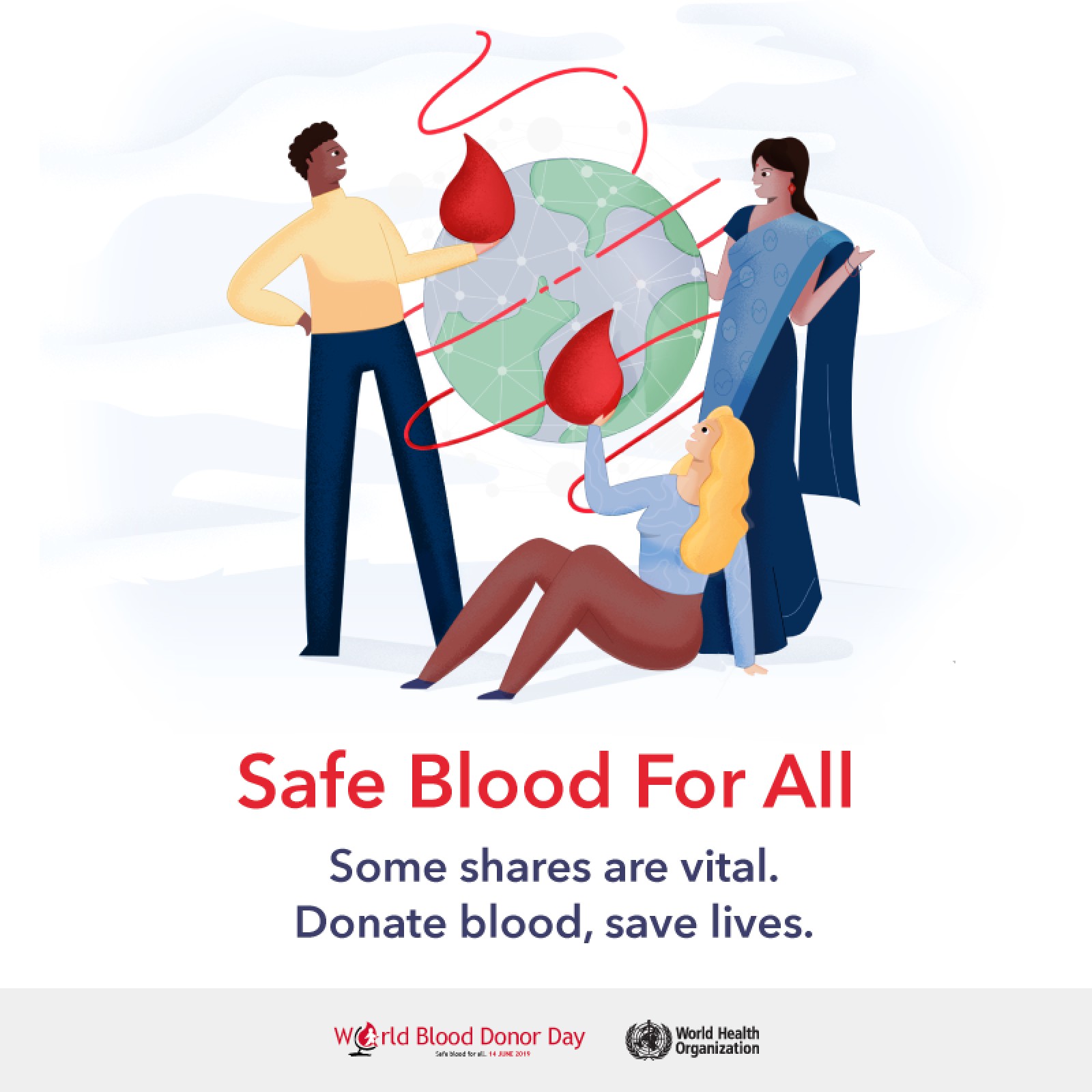Safe blood for all
This year, World Blood Donor Day will once again be celebrated around the world on 14 June. The event serves to thank voluntary, unpaid blood donors for their life-saving gifts of blood and also to raise awareness of the need for regular blood donations to ensure that all individuals and communities have access to affordable and timely supplies of safe and quality-assured blood and blood products, as an integral part of universal health coverage and a key component of effective health systems.
Transfusion of blood and blood products save millions of lives every year. Blood and blood products are essential components in the proper management of women suffering from bleeding associated with pregnancy and childbirth; children suffering from severe anemia due to malaria and malnutrition; patients with blood and bone marrow disorders, inherited disorders of hemoglobin and immune deficiency conditions; victims of trauma, emergencies, disasters and accidents; as well as patients undergoing advanced medical and surgical procedures. Although the need for blood and blood products is universal, there is a marked difference in the level of access to safe blood and blood products across and within countries. In many countries, blood services face the additional challenge of making sufficient blood and blood products available, while also ensuring its quality and safety.
In May 2005, during the Fifty-Eighth World Health Assembly, ministers of health from across the world made a unanimous declaration of commitment and support towards voluntary blood donation. Through resolution WHA58.13, they designated World Blood Donor Day as an annual event to be held each year on 14 June. The resolution furthermore urges Member States to implement, and support well organized, nationally-coordinated and sustainable blood programs with appropriate regulatory oversight. The support requires that governments provide adequate financing for high-quality blood donation services and for the expansion of these services so that sufficient safe blood can be collected to meet the needs of patients. In 2009, experts in transfusion medicine, policy-makers and nongovernmental representatives from 40 countries formulated the Melbourne Declaration, which set up a goal for all countries to obtain all their blood supplies from voluntary unpaid donors by 2020.
Focus of this year’s campaign
The theme of this year’s campaign is blood donation and universal access to safe blood transfusion, as a component of achieving universal health coverage. We have developed the slogan “Safe blood for all” to raise awareness of the universal need for safe blood in the delivery of health care and the crucial roles that voluntary donations play in achieving the goal of universal health coverage. The theme strongly encourages more people all over the world to become blood donors and donate blood regularly – actions which are key to building a strong foundation of sustainable national blood supplies that are sufficient to meeting the needs of all patients requiring transfusion.
The day and the theme is also a call to action to all governments, national health authorities and national blood services to provide adequate resources and put in place systems and infrastructures to increase collection of blood from voluntary, regular unpaid blood donors; to provide quality donor care; to promote and implement appropriate clinical use of blood, and to set up systems for the oversight and surveillance on the whole chain of blood transfusion.
The objectives of this year’s campaign are:
• to celebrate and thank individuals who donate blood and to encourage those who have not yet donated blood to start donating;
• to highlight the need for committed, year-round blood donation, to maintain adequate supplies and achieve universal and timely access to safe blood transfusion;
• to focus attention on donor health and the quality of donor care as critical factors in building donor commitment and a willingness to donate regularly;
• to demonstrate the need for universal access to safe blood transfusion and provide advocacy on its role in the provision of effective health care and in achieving the goal of universal health coverage;
• to mobilize support at national, regional and global levels among governments and development partners to invest in, strengthen and sustain national blood programs.
Resource: https://www.who.int/campaigns/world-blood-donor-day/2019





